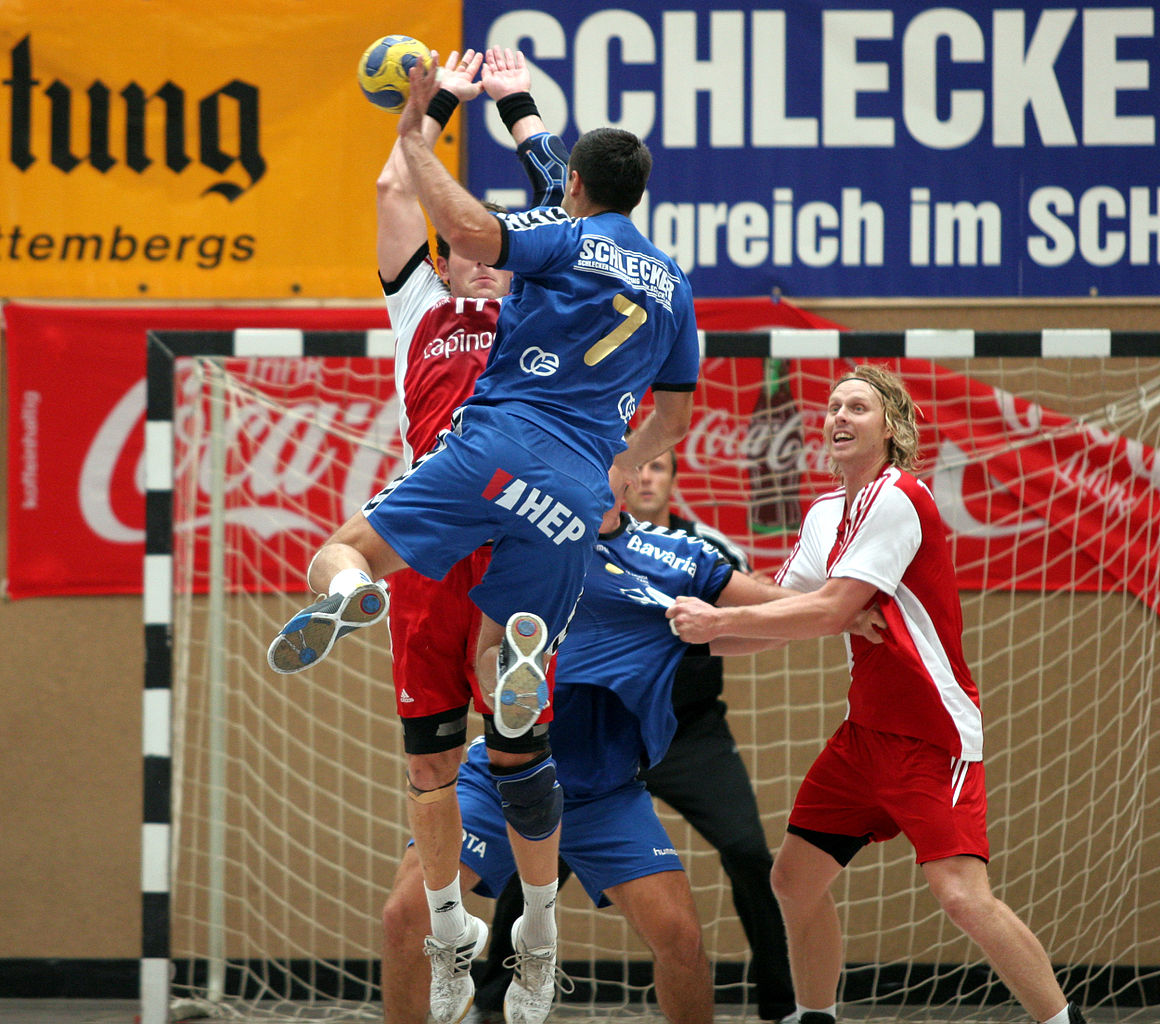Situational Analysis and Tactical Decision-Making in Elite Handball Players

|
OPEN ACCESS: Artigo disponível/Article available/Artículo disponible - ASSINANTE/SUBSCRIBER: Artigo para Assinante do periódico/Article for Journal Subscriber/Artículo para suscriptores de este periódico - PAY-PER-VIEW: Compre o artigo e leia/Buy the article and read/Compra el artículo y lee - IMAGE: Photographer: Armin Kübelbeck, CC BY-SA 3.0, Wikimedia Commons |
Keywords:
Handball, technical correctness, temporal occlusion, probabilityAbstract
Situational analysis and decision-making represent key elements of elite sports performances, but few studies have investigated which player’s skills related to these aspects are relevant in elite handballers. The aim of this study was to address differences among handballers belonging to two tiers in processing situational probabilities information related to offensive and defensive situations. A total of 38 handballers (male = 22, female = 16, age: 25.6 ± 6.5 years, first-tier = 11, second-tier = 27) saw videos about different offensive and defensive actions. According to the temporal occlusion paradigm, each handballer provided a response about the best action a selected player had to perform according to the game’s context. The time, accuracy, and technical correctness of each player’s response were assessed. MANOVA revealed moderate-to-high skills differences between first- and second-tier players. First-tier players provided higher scores in response time and accuracy; they also obtained higher technical correctness scores in the most complex situation. The members of the first tier seemed to mainly depend on the accuracy of responses, even if the technical correctness also resulted in a predictor in the most complex situation. Playing in the best tier seems to require the development of very good skills related to processing situational probability information; therefore, training these elements seems to be necessary for determining the differences among elite handballers.
ARK
— Identificador persistente da Edição 2023 OLYMPIKA MAGAZINE - VOLUME 1 ONLINE - Nº. 001: https://n2t.net/ark:/40019/oly.v1i1
— Identificador persistente deste artigo: https://n2t.net/ark:/40019/oly.v1i1.4.g10
References
(1) Davids K, Araújo D, Correia V, Vilar L. How Small-Sided and Conditioned Games Enhance Acquisition of Movement and Decision-Making Skills. Exercise and Sport Sciences Reviews. 2013 Jul;41(3):154–61.
(2) Allard F, Burnett N. Skill in Sport. Can. J. Psychol. Rev. Can. Psychol. 1985; 39, 294–312.
(3) Silva AF, Conte D, Clemente FM. Decision-Making in Youth Team-Sports Players: A Systematic Review. International Journal of Environmental Research and Public Health. 2020 May 27;17(11):3803.
(4) Barraclough AS, Till K, Kerr A, Emmonds S. Methodological Approaches to Talent Identification in Team Sports: A Narrative Review. Sports. 2022 May 24;10(6):81.
(5) Harper DJ, Carling C, Kiely J. High-Intensity Acceleration and Deceleration Demands in Elite Team Sports Competitive Match Play: A Systematic Review and Meta-Analysis of Observational Studies. Sports Medicine. 2019 Sep 10;49(12).
(6) Petway AJ, Freitas TT, Calleja-González J, Medina Leal D, Alcaraz PE. Training load and match-play demands in basketball based on competition level: A systematic review. Balsalobre-Fernández C, editor. PLOS ONE. 2020 Mar 5;15(3):e0229212.
(7) Vickers JN. Perception, Cognition, and Decision Training: The Quiet Eye in Action; Human Kinetics: Champaign, IL, USA, 2007.
(8) Nicolosi S. Strategie didattiche per l’educazione motoria. Milano: Franco Angeli Editore, Cop; 2015.
(9) Müller S, Gurisik Y, Hecimovich M, Harbaugh AG, Vallence AM. Individual Differences in Short-Term Anticipation Training for High-Speed Interceptive Skill. Journal of Motor Learning and Development. 2017 Jun;5(1):160–76.
(10) Williams AM, Jackson RC. Anticipation in sport: Fifty years on, what have we learned and what research still needs to be undertaken? Psychology of Sport and Exercise. 2019 May;42:16–24.
(11) Tenenbaum G, Eklund RC. Handbook of Sport Psychology. John Wiley & Sons; 2007.
(12) Farrow D, Reid M. The contribution of situational probability information to anticipatory skill. Journal of Science and Medicine in Sport. 2012 Jul;15(4):368–73.
(13) A Mark Williams, Davids K, Williams JGP. Visual perception and action in sport. London: Taylor & Franics; 2008.
(14) Bar-Eli M, Henning Plessner, Raab M, Ebrary I. Judgement, decision making and success in sport. Malden, Mass.: Wiley; 2011.
(15) Johnson JG, Raab M. Take The First: Option-generation and resulting choices. Organizational Behavior and Human Decision Processes. 2003 Jul;91(2):215–29.
(16) Raab M. Simple heuristics in sports. International Review of Sport and Exercise Psychology. 2012 Sep;5(2):104–20.
(17) Bonnet G, Debanne T, Laffaye G. Toward a better theoretical and practical understanding of field players’ decision-making in handball: A systematic review. Movement & Sport Sciences - Science & Motricité. 2020;(110):1–19.
(18) Hinz M, Lehmann N, Musculus L. Elite Players Invest Additional Time for Making Better Embodied Choices. Frontiers in Psychology. 2022 Jun 6;13.
(19) Schmidt RA, Timothy Donald Lee, Winstein CJ, Wulf G, Zelaznik HN. Motor control and learning : a behavioral emphasis. Champaign, Il: Human Kinetics; 2019.
(20) Johnson JG. Cognitive modeling of decision making in sports. Psychology of Sport and Exercise. 2006 Nov;7(6):631–52.
(21) Mann DTY, Williams AM, Ward P, Janelle CM. Perceptual-Cognitive Expertise in Sport: A Meta-Analysis. Journal of Sport and Exercise Psychology. 2007 Aug;29(4):457–78.
(22) Hinz M, Lehmann N, Melcher K, Aye N, Vanja Radić, Wagner H, et al. Reliability of Perceptual-Cognitive Skills in a Complex, Laboratory-Based Team-Sport Setting. Applied sciences. 2021 Jun 3;11(11):5203–3.
(23) Milazzo N, Farrow D, Ruffault A, Fournier JF. Do karate fighters use situational probability information to improve decision-making performance during on-mat tasks? Journal of Sports Sciences. 2015 Dec 14;34(16):1547–56.
(24) Biscaia P, Coelho E, Antonio Hernández Mendo, Alves J. Processamento da informação e antecipação em jogadoras de andebol de elite: Da formação ao alto nível: da formação ao alto nível. Revista Iberoamericana de Psicología del Ejercicio y el Deporte. 2018 Jan 1;13(2):179–91.
(25) Robertson K, De Waelle S, Deconinck FJ, Lenoir M. Differences in expertise level for anticipatory skill between badminton “in game” strokes and serves. International Journal of Sports Science & Coaching. 2021 Nov 14;174795412110469.
(26) Hodges NJ, Huys R, Starkes JL. Methodological Review and Evaluation of Research in Expert Performance in Sport. In Handbook of Sport Psychology; Tenenbaum, G., Eklund, R.C., Eds.; Wiley: New York, NY, USA, 2007; pp. 159–183.
(27) Araújo D, Hristovski R, Seifert L, Carvalho J, Davids K. Ecological cognition: expert decision-making behaviour in sport. International Review of Sport and Exercise Psychology. 2017 Jul 9;12(1):1–25.
(28) McAuley ABT, Baker J, Kelly AL. Defining “elite” status in sport: from chaos to clarity. German Journal of Exercise and Sport Research. 2021 Aug 5;
(29) Baker J, Farrow D. Routledge handbook of sport expertise. London ; New York: Routledge; 2015.
(30) Farrow D, Baker J, Macmahon C. Developing sport expertise : researchers and coaches put theory into practice. London: Routledge; 2007.
(31) Ward P, Ericsson KA, Williams AM. Complex Perceptual-Cognitive Expertise in a Simulated Task Environment. Journal of Cognitive Engineering and Decision Making. 2012 Oct 3;7(3):231–54.
(32) Powless MD, Steinfeldt JA, Fisher SE, McFadden P, Kennedy KW, Bellini S. Utilizing Video-Based Trainings to Improve Decision Making in High School Quarterbacks. Sports. 2020 Feb 6;8(2):18.
(33) Wiman M, Salmoni AW, Hall CR. An Examination of the Definition and Development of Expert Coaching. Int. J. Coach. Sci. 2010; 4, 37–60.
(34) Koopmann T, Faber I, Baker J, Schorer J. Assessing Technical Skills in Talented Youth Athletes: A Systematic Review. Sports Medicine. 2020 Jun 3; 50, 1593–1611.
(35) Cohen J. Statistical Power Analysis for the Behavioral Sciences. Routledge: London, UK, 2013.
(36) Hoffman RR, Hancock PA, Scerbo MW, Raja Parasuraman, Szalma JL. The Cambridge Handbook of Applied Perception Research. Cambridge University Press; 2015.
(37) Ward P, Suss J, Eccles DW, Williams AM, Harris KR. Skill-based differences in option generation in a complex task: a verbal protocol analysis. Cognitive Processing. 2011 Apr 2;12(3):289–300.
(38) Ward P, Williams AM. Perceptual and Cognitive Skill Development in Soccer: The Multidimensional Nature of Expert Performance. Journal of Sport and Exercise Psychology. 2003 Mar;25(1):93–111.
(39) Ward P, Suss J, Itay Basevitch. Expertise and Expert Performance-Based Training (ExPerT) in Complex Domains. 2009 Mar 1;7(2):121–45.
(40) Sohn YW, Doane SM. Memory Processes of Flight Situation Awareness: Interactive Roles of Working Memory Capacity, Long-Term Working Memory, and Expertise. Human Factors: The Journal of the Human Factors and Ergonomics Society. 2004 Sep;46(3):461–75.
(41) Sohn YW, Doane SM. Roles of working memory capacity and long-term working memory skill in complex task performance. Memory & Cognition. 2003 Apr;31(3):458–66.
(42) Klein M. The Recognition-Primed Decision (RPD) Model: Looking Back, Looking Forward. In Naturalistic Decision Making; Psychology Press: New York, NY, USA, 1997; p. 440.
(43) Raab M, Johnson JG. Expertise-based differences in search and option-generation strategies. Journal of Experimental Psychology: Applied. 2007;13(3):158–70.
(44) Buszard T. On Learning to Anticipate in Youth Sport. Sports Medicine. 2022 May 27; 52, 2303–2314.
(45) Taleb, N.N. (Anti) Fragility and Convex Responses in Medicine. In Unifying Themes in Complex Systems IX; Morales, A.J., Gershenson, C., Braha, D., Minai, A.A., Bar-Yam, Y., Eds.; Springer Proceedings in Complexity; Springer International Publishing: Cham, Switzerland, 2018; pp. 299–325.
(46) Bonini N, Fabio Del Missier, Rino Rumiati. Psicologia del giudizio e della decisione. 2008.
(47) K Anders Ericsson, Smith J. Toward a general theory of expertise : prospects and limits. Cambridge ; New York: Cambridge University Press; 1991.
(48) Gabbett T, Rubinoff M, Thorburn L, Farrow D. Testing and Training Anticipation Skills in Softball Fielders. International Journal of Sports Science & Coaching. 2007 Mar;2(1):15–24.
(49) Hopwood MJ, Mann DL, Farrow D, Nielsen T. Does Visual-Perceptual Training Augment the Fielding Performance of Skilled Cricketers? International Journal of Sports Science & Coaching. 2011 Dec;6(4):523–35.
(50) Smeeton NJ, Williams AM, Hodges NJ, Ward P. The Relative Effectiveness of Various Instructional Approaches in Developing Anticipation Skill. Journal of Experimental Psychology: Applied. 2005;11(2):98–110.
(51)Williams AM, Ward P, Knowles JM, Smeeton NJ. Anticipation skill in a real-world task: Measurement, training, and transfer in tennis. Journal of Experimental Psychology: Applied. 2002;8(4):259–70.
OBS:
Artigo adaptado e traduzido para o português pelos editores de OLYMPIKA MAGAZINE para republicação, conforme normas de submissão do periódico. Versão original em: https://www.mdpi.com/2076-3417/13/15/8920 LICENÇA ORIGINAL E DA ADAPTAÇÃO: © 2023 by the authors https://creativecommons.org/licenses/by/4.0/.
Imagem meramente ilustrativa. Fonte: Photographer: Armin Kübelbeck, CC BY-SA 3.0, Wikimedia Commons
Published
How to Cite
Issue
Section
ARK
License
Copyright (c) 2023 Simona Nicolosi, Antonella Quinto, Mario Lipoma

This work is licensed under a Creative Commons Attribution 4.0 International License.






